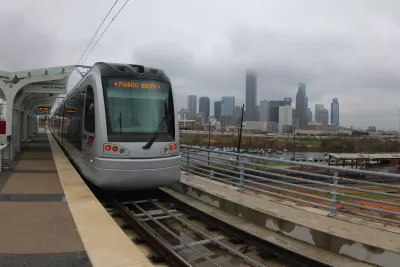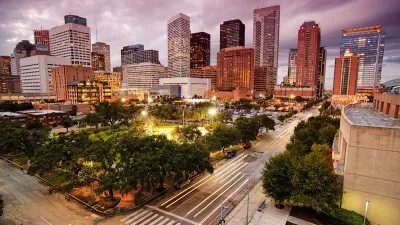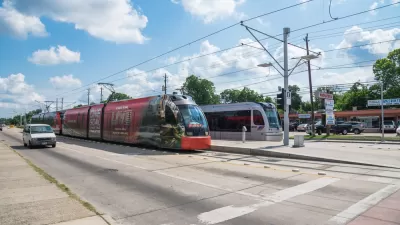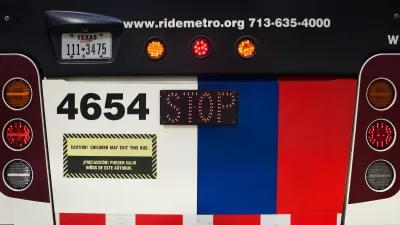While ridership dropped during the pandemic, many 'essential workers' continued to rely on Houston Metro's services, signaling the crucial role of public transit for the city's economy.

Dug Begley describes the findings of a report from Air Alliance, transportation advocacy group LINK Houston and the Robert D. Bullard Center for Environmental and Climate Justice at Texas Southern University that calls for greater funding of public transportation in the Houston region.
"Overall, Metro ridership dropped to about one-eighth normal levels early in the pandemic, leading the agency to drastically scale back bus and train service." But "many said the service offered was a crucial lifeline." According to researcher Nikki Hawkins-Knight, "[w]e cannot continue to build cities and hope to positively impact the health of our economy and communities without frequently assessing the impacts, deficiencies and user needs." Hawking-Knight goes on to say "[t]he transit ecosystem must integrate safety, sanitation, connectivity and overall reliability for it to be a true asset."
"The findings, authors said, point to more transit investment as a way to keep key employees showing up for work, offer a viable and safe option for travel and reduce pollution all at once." Ashley Johnson, director of community affairs at LINK Houston and a study co-author, says "Metro must continue to restore service and equitably implement its Moving Forward Plan as the COVID-19 pandemic demonstrates the vital role public transit plays in the economic vitality of our region."
FULL STORY: Despite fewer people riding Metro in Houston, report makes case for more public transit

Alabama: Trump Terminates Settlements for Black Communities Harmed By Raw Sewage
Trump deemed the landmark civil rights agreement “illegal DEI and environmental justice policy.”

Planetizen Federal Action Tracker
A weekly monitor of how Trump’s orders and actions are impacting planners and planning in America.

The 120 Year Old Tiny Home Villages That Sheltered San Francisco’s Earthquake Refugees
More than a century ago, San Francisco mobilized to house thousands of residents displaced by the 1906 earthquake. Could their strategy offer a model for the present?

In Both Crashes and Crime, Public Transportation is Far Safer than Driving
Contrary to popular assumptions, public transportation has far lower crash and crime rates than automobile travel. For safer communities, improve and encourage transit travel.

Report: Zoning Reforms Should Complement Nashville’s Ambitious Transit Plan
Without reform, restrictive zoning codes will limit the impact of the city’s planned transit expansion and could exclude some of the residents who depend on transit the most.

Judge Orders Release of Frozen IRA, IIJA Funding
The decision is a victory for environmental groups who charged that freezing funds for critical infrastructure and disaster response programs caused “real and irreparable harm” to communities.
Urban Design for Planners 1: Software Tools
This six-course series explores essential urban design concepts using open source software and equips planners with the tools they need to participate fully in the urban design process.
Planning for Universal Design
Learn the tools for implementing Universal Design in planning regulations.
Clanton & Associates, Inc.
Jessamine County Fiscal Court
Institute for Housing and Urban Development Studies (IHS)
City of Grandview
Harvard GSD Executive Education
Toledo-Lucas County Plan Commissions
Salt Lake City
NYU Wagner Graduate School of Public Service





























